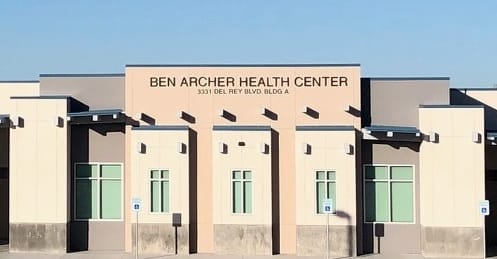Healthcare access for undocumented migrants in Las Cruces remains uncertain
Community groups and local providers seek alternative solutions amid Ben Archer Health Center controversy

Damien Willis, Organ Mountain News
LAS CRUCES - On Feb. 26, Ben Archer Health Center, a major provider of low-cost health care in southern New Mexico, implemented a policy requiring proof of citizenship for services, citing former President Donald Trump's executive order, "Ending Taxpayer Subsidization of Open Borders," issued Feb. 19, 2025.
This decision led to reports of patients being denied care, including a diabetic individual unable to refill an insulin prescription and another patient denied psychotropic medication at an on-site pharmacy. A notice at a school-based clinic in Las Cruces stated that individuals "who entered the United States illegally or are otherwise unlawfully present" did not qualify for federally funded services at Ben Archer Health Center.
Following intervention from the New Mexico Department of Health and the New Mexico Primary Care Association, these notices were removed. However, U.S. Sen. Martin Heinrich and U.S. Rep. Gabe Vasquez have urged state Attorney General Raúl Torrez to investigate the health center's practices, citing continued inconsistent enforcement of the policy. They emphasized that both state and federal laws require publicly funded clinics to provide care to all local residents, regardless of citizenship status.
This issue arises amid a measles outbreak, underscoring the critical need for accessible vaccinations and treatment.
Existing health care options for undocumented migrants
Undocumented individuals in New Mexico are not eligible for Medicaid or coverage under the Affordable Care Act, limiting their medical care options outside of emergency services. In Las Cruces, several community-based providers continue to offer health care regardless of immigration status.
Amador Health Center, located at 999 W. Amador Ave., provides medical, dental and behavioral health services through a sliding-scale fee system. Similarly, La Clinica de Familia operates multiple clinics throughout Doña Ana County, serving low-income and uninsured patients, including those without legal status.
The New Mexico Department of Health’s Public Health Office in Las Cruces offers vaccinations, reproductive health services and disease screenings, while the Doña Ana County Health and Human Services Department connects residents with health care resources, including the Health Care Assistance Program.
Despite these options, recent uncertainty surrounding policies at Ben Archer Health Center has raised concerns that other providers may face similar pressures to restrict care for undocumented patients. Community organizations and health care advocates are now exploring alternative models of care to address these challenges.
New approaches to health care in the border zone
Las Cruces is within the 100-mile border zone, where undocumented individuals traveling outside the area may encounter Border Patrol checkpoints, further complicating access to health care. Advocates are seeking ways to bring health care to patients, minimizing the need for travel.
One potential solution is mobile health clinics, which could provide basic medical services in remote or underserved areas. Integrating health care services into existing community outreach programs, such as food distribution events or church services, could also help reach patients discreetly.
Telemedicine is emerging as a key tool for health care access, allowing patients to consult with medical professionals remotely without visiting a brick-and-mortar clinic. Some nonprofit organizations are developing secure telehealth platforms tailored to the needs of undocumented communities.
For those employed in agriculture, construction or service industries, employer-sponsored medical care is another avenue under discussion. Some local farms and businesses may explore the idea of hiring on-site health care providers to treat employees directly, reducing the need for undocumented workers to seek external medical services.
Legal and policy advocacy
Beyond immediate health care solutions, immigrant rights groups are advocating for sanctuary health care zones, which would allow clinics to refuse cooperation with immigration enforcement efforts. Legal experts argue that existing federal laws require clinics to serve all local residents, regardless of status, and that future policy challenges could clarify protections for undocumented patients.
Grassroots efforts include underground health networks, where trusted community members — including medical professionals — provide care outside formal clinical settings. These initiatives, while unofficial, are becoming increasingly relevant as traditional health care providers face pressure from the federal government to restrict services.
A path forward
While Ben Archer Health Center has stated that it rescinded its proof-of-citizenship policy, reports of inconsistent enforcement persist, leaving many undocumented migrants wary of sudden policy shifts that could once again leave them without medical care.
Health care advocates in Las Cruces emphasize the need for long-term solutions that ensure stability and accessibility for all residents, regardless of immigration status. From expanding mobile clinics and telehealth services to advocating for legal protections, the community has begun discussing ways to create a health care system resilient to policy changes.
As these efforts continue, undocumented residents must navigate an uncertain future — one where access to health care remains a matter of both medical necessity and legal risk.
Damien Willis is founder and editor of Organ Mountain News. He can be reached at OrganMountainNews@gmail.com or on X at @damienwillis.
